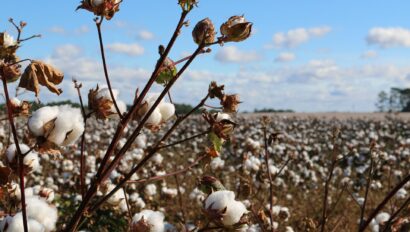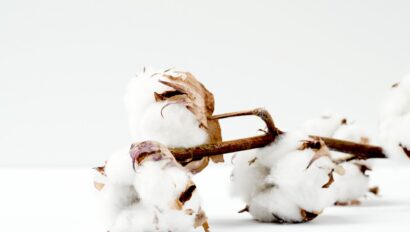Gap Inc. and Textile Exchange to Publish Sustainable Fibers Toolkit for Apparel Industry
SAN FRANCISCO – SEPTEMBER 10, 2020 – Gap Inc. (NYSE: GPS) and Textile Exchange are proud to announce the public release of Gap Inc.’s Preferred Fiber Toolkit (PFT), a resource to be used by sourcing and design teams to inform companies on meeting their sustainability goals.
With this partnership, the Toolkit will be developed as a publicly available, industry-wide resource, providing companies with consolidated, validated guidance so that together we can create healthier communities while better protecting the planet.
As an industry, apparel and retail have struggled to cohesively measure and explain sourcing material choices, often resorting to a brand-by-brand decision-making process that can be subjective and opaque. With customers, employees, and other shareholders expecting higher levels of transparency than ever, brands are working to source and market more sustainable fibers.
The Toolkit includes a rigorous evaluation of raw material choices building upon quantitative data inputs from the Sustainable Apparel Coalition’s (SAC) Higg Materials Sustainability Index. It also incorporates other holistic indicators to consider environmental considerations, such as biodiversity and land-use change, and waste-elimination guidance for contributing to the circular economy. Human rights, labor concerns, and animal welfare within raw material sourcing are also considered, to layer in additional nuance beyond environmental data. This tool will provide clear direction to create alignment and reduce the proliferation of conflicting guidance.
“The development of the PFT has been crucial to Gap Inc’s ability to set goals and develop internal awareness on how to design better products and set fiber strategies,” said Diana Rosenberg, Product Sustainability Manager, Gap Inc. “A rigorous and data-driven approach allows for greater confidence in our sustainable materials sourcing decisions, while creating an incentive to select more planet-friendly raw materials.”
As Textile Exchange updates this tool for broader use, it will have refined methodology and an independent review process. This Toolkit will serve as a complement to the SAC’s Product Tools, by expanding coverage of fiber sourcing considerations beyond the measurable environmental impacts contained within the Higg MSI. The PFT will ensure we drive the industry forwards on sustainability performance within our fiber choices, including a reduction in climate impacts that aligns with science-based targets.
“Textile Exchange was part of the early days of the work alongside other independent reviewers such as the Sustainable Apparel Coalition (SAC), we are pleased to be given the responsibility and ownership of the tool starting in 2020,” Liesl Truscott, Director of Europe and Materials Strategy, Textile Exchange added. “We will continue to improve upon the foundational work of Gap Inc. to create a tool that combines quantitative and qualitative data from materials into a decision-making tool for the industry. This tool will drive the work of Textile Exchange to meet our 2030 Climate+ goals.”
Textile Exchange will update the Toolkit with new data and a broader set of fibers and materials and begin using this tool to drive the adoption of the materials recognized for their contribution. Textile Exchange will also work to identify areas of further reduction of impacts to support the industry in meeting science-based targets. The updated Toolkit and the proposed review process will be shared with stakeholders for comments and feedback later this year.
“The Sustainable Apparel Coalition is thrilled to see the release of the Preferred Fiber Toolkit (PFT). With the embedded Higg MSI data and other qualitative indicators in the PFT, users can consider environmental impacts and additional sustainability values in their sourcing decisions. By aligning the PFT with Higg MSI data, users of both tools can seamlessly track the impacts of their decisions from fiber to full materials and products,” said Joël Mertens, Senior Manager of Higg Product Tools, Sustainable Apparel Coalition.
About Gap Inc.
Gap Inc. is a leading global retailer offering clothing, accessories, and personal care products for men, women, and children under the Old Navy, Gap, Banana Republic, Athleta, Intermix, Janie and Jack, and Hill City brands. Fiscal year 2019 net sales were $16.4 billion. Gap Inc. products are available for purchase worldwide through company-operated stores, franchise stores, and e-commerce sites. For more information, please visit www.gapinc.com.
About Textile Exchange
Textile Exchange is a global nonprofit that creates leaders in the sustainable fiber and materials industry. The organization develops, manages, and promotes a suite of leading industry standards as well as collects and publishes vital industry data and insights that enable brands and retailers to measure, manage, and track their use of preferred fiber and materials.
With a membership that represents leading brands, retailers, and suppliers, Textile Exchange has, for years, been positively impacting climate through accelerating the use of preferred fibers across the global textile industry and is now making it an imperative goal through its 2030 Strategy: Climate+. Under the Climate+ strategic direction, Textile Exchange will be the driving force for urgent climate action with a goal of 45% reduced CO2 emissions from textile fiber and material production by 2030.
To learn more about Textile Exchange, visit TextileExchange.org. Follow us on Twitter at @TextileExchange.

